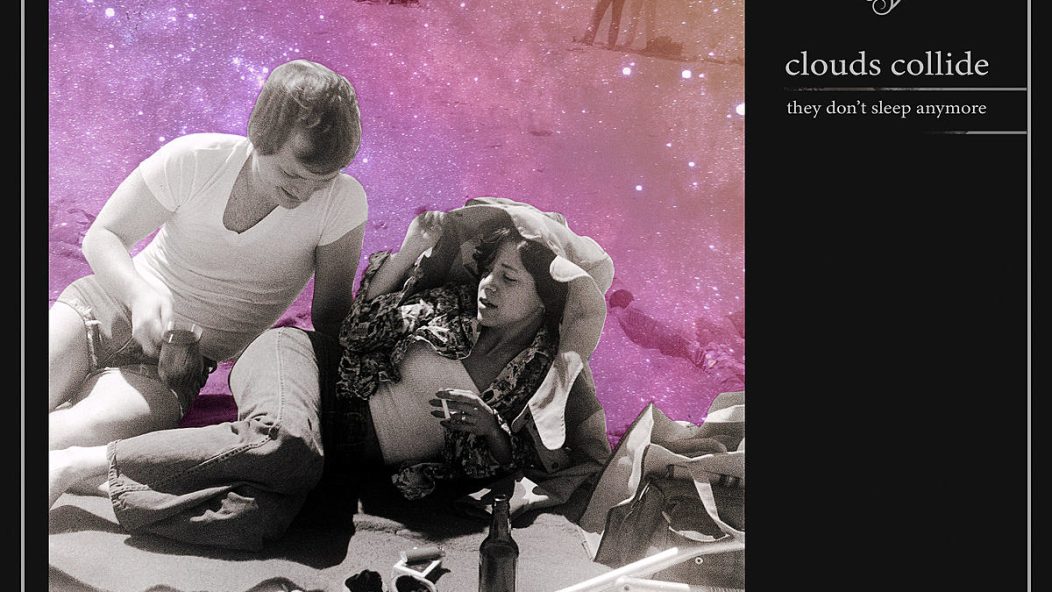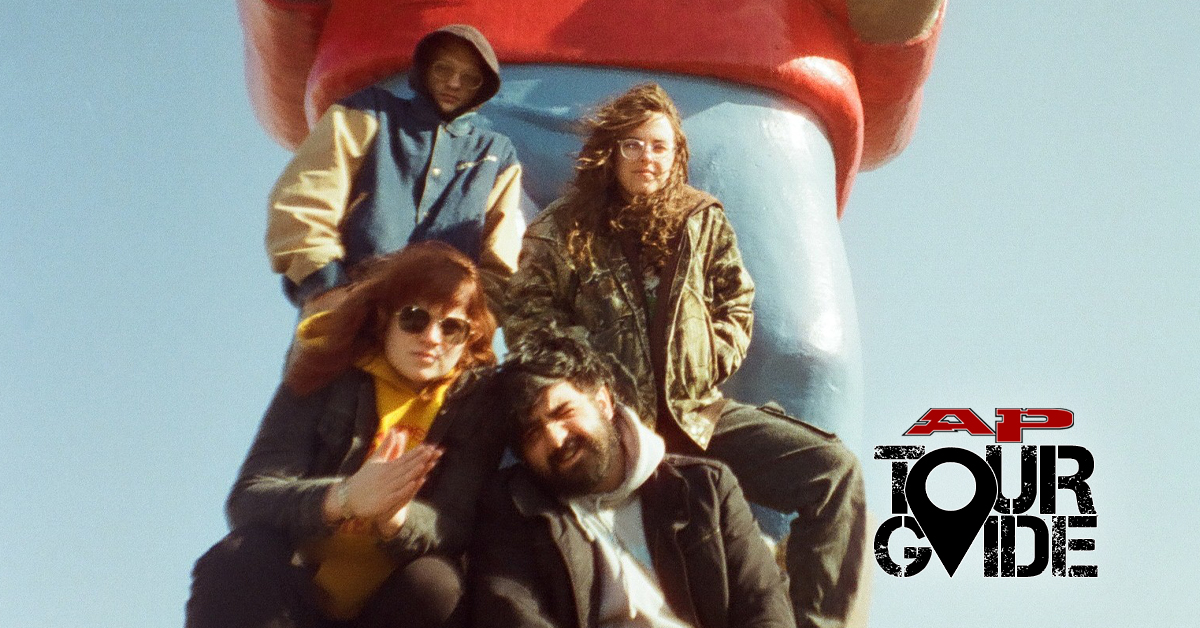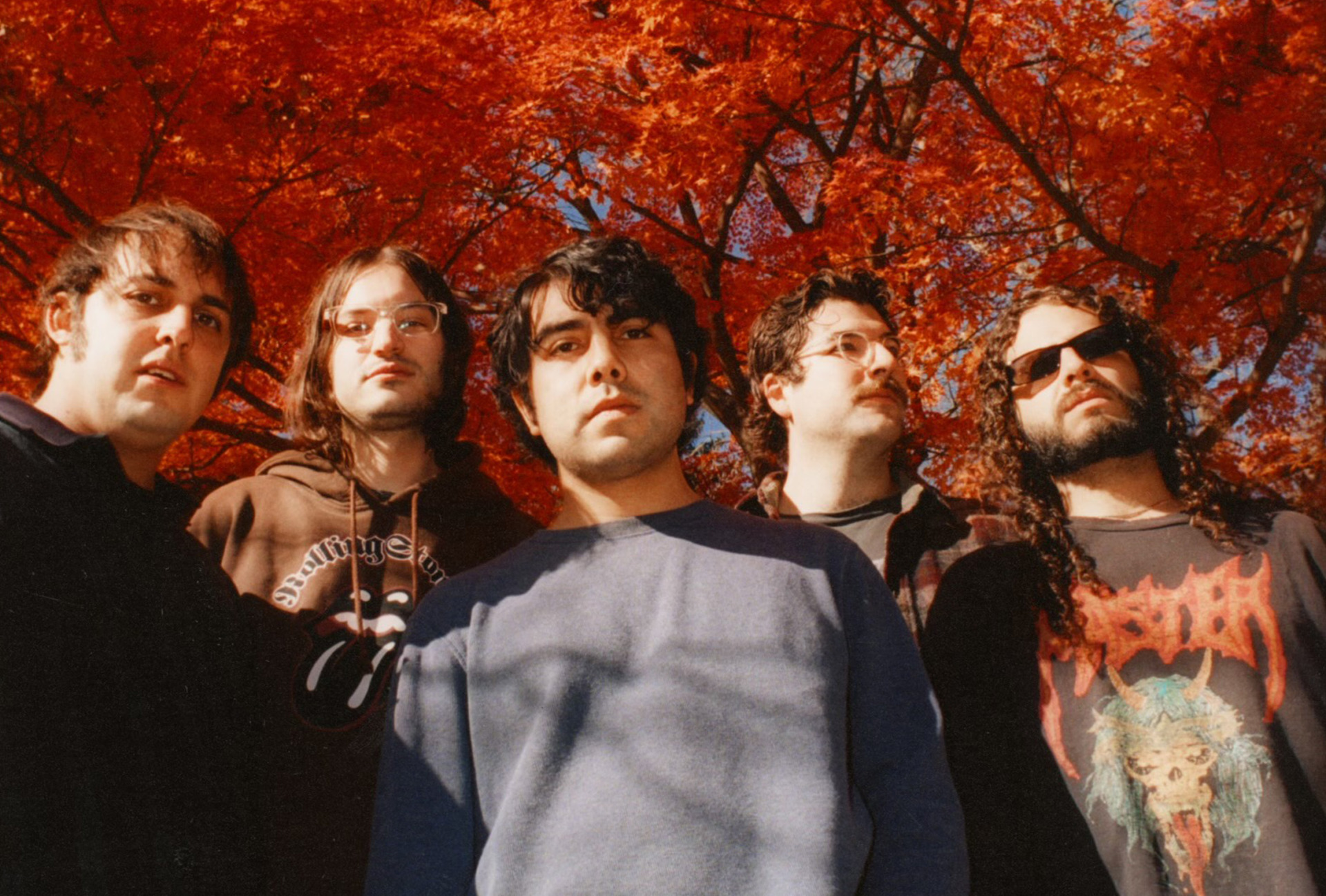
Beyond the Stratosphere: Clouds Collide Talks New Album "They Don't Sleep Anymore"

…
Christopher Pandolfo is intimately familiar with the smothering despondency of grief. The soul-negating wasteland of loss is where he returns, time and time again, drawing from it to fuel his ongoing musical explorations as Clouds Collide. Across his body of work, Pandolfo sifts through the architecture of this foundational human state of being, hauling his own experiences through the gauntlet of his creative processes to emerge with his feet planted on more secure ground.
As Clouds Collide, Pandolfo assembles layered, sprawling soundscapes that carve out the topography of anguish. As he traverses it, and we along with him, he meanders up and down the tributaries feeding into this churning and frothed gorge. Pandolfo, our ever-present guide, navigates us through longing and doubt, through fear and unbridled wrath, through a reckoning between one’s prior and current selves.
It is this struggle with which Pandolfo grapples on They Don’t Sleep Anymore, Clouds Collide’s upcoming full-length album. With his previous albums centered on the loss of his mother to cancer and his ongoing response to her passing, Pandolfo now challenges himself to face today’s trials as an irreversibly changed person while negotiating the creeping nostalgia for prior years.
They Don’t Sleep Anymore (streaming in full exclusively below before tomorrow’s release) showcases Pandolfo’s talents as a songsmith in full bloom, his compositions writhing between themes, swelling organically with strained breaths taken through a creaking and fractured rib cage. Handling nearly all the performances himself, Pandolfo demonstrates on each instrument the ability to deploy notes and passages with purposeful precision. Guitars are cloaked in fuzz one moment while shimmering brilliantly the next, under which a soothing cymbal wash crackles over feverishly throbbing kicks and tumbling toms. Each segment in his roaming songs is arranged with a meticulous hand unable to rest until every piece has been tweezer-placed exactly as it belongs.
…
…
No instrument reflects Pandolfo’s extreme dedication to the perfect moment as his vocals. Pandolfo batters his lyrics with ragged wails, cradles them in the crook of his fragile waver, and frequently layers one style over the other. He’s the first to admit that the screams he pulls from within himself come at a painful price, but the results justify any temporary setbacks. There’s an honesty in his performances that’s often lost in the hands–or throat—of vocalists with a more technically refined delivery.
In celebration of They Don’t Sleep Anymore, we spoke in detail with Pandolfo about his latest work as well as his overall journey as Clouds Collide. With each Clouds Collide release, Pandolfo invites his listeners to accompany him through the merciless ravages of introspection, weathering the pain of this process in search of the redemptive catharsis it brings. “Come fall with me into this rabbit hole” he croons on the penultimate track “Parallel Ruminations,” and you’re invited to accept his invitation.
…

…
They Don’t Sleep Anymore comes as the third in a projected series of four works. Can you contextualize this latest record within your ongoing body of music? What role does it play in your overall narrative and artistic construction? How would you characterize the creative progression and evolution of Clouds Collide up to and including this record?
This album is in many ways different, but I wanted it to still fit within the idea of this four-season cycle, this one following the season of Summer. Most of the oldest Clouds Collide songs are oddly from All Things Shining, and I later on began writing material that was much colder during the winter of 2010, I believe. That is when I had the idea of starting with Winter and then progressing through Spring, Summer, and Autumn for the remaining albums.
When I was writing music and lyrics for this album, I wasn’t necessarily paying attention to a season in particular. Summer is referenced, but that’s where my head was at a few times. The idea of these four albums is more or less catharsis for my painfully nostalgic self and how I’m growing as a person and songwriter since the death of my mother. This new album will actually be streaming on the ten-year anniversary of losing her to ovarian cancer. That’ll be a fucking roller coaster, I’m sure.
The album also sounds a lot more pronounced than anything I’ve done before. I had many ideas for how I imagined this album to sound, and a set of five ten-minute-long songs was definitely not what I had originally envisioned. Unlike before, I wrote a lot of these songs much more recently compared to previously tracked songs on the first two albums.
Until the Wind Stops Blowing… is primarily about grief, memories, and my remarkably poor mental health during winter, and All Things Shining goes into accepting and overcoming grief, alcohol abuse on my part, and such. They Don’t Sleep Anymore is kind of a self-reflective type of album for me. Somehow, it’s my most personal album, and at first, I felt nervous saying the things I was saying. It’s a little all over the place from insomnia, questioning reality and our brains, the feeling of falling in love, heartbreak, perception of life as a child to being 30 years old, and so on.
Although I’ve grown a lot in the last five years, I still think the most definitive root to the theme of this album is a pure and utter longing for the past, which is kind of the reason I write music in the first place.
I couldn’t think of a more honest and poignant way to commemorate all that your mother meant to you, and I’m honored that we’re able to provide you with a platform for your album’s unveiling on such a meaningful day. Given that your previous work covers grief, loss, substance abuse and mental health, it’s setting a pretty high bar in terms of soul-baring — if we can dig a little deeper, how have you concluded that, in light of your other records, this is the most personal one for you?
Without being too vague, I feel like a lot of this album is me figuring myself out as I age while learning to accept the imperfections of my mind. In a way, this album is even more mental health-heavy than before. The lyrics are probably my most strange in one moment and then the most straightforward in another, but to me, each line means something largely personal in the way I see life itself anymore and my part in it. My music has always been from the heart, heavily revolving around family and memories, but this is definitely a deeper dive into understanding who I am and why I am the way I am.
Did it feel strange at all to rearrange your work so that you were releasing newer songs before older ones?
At first it did feel a bit weird, but a lot of the material I had written years ago for All Things Shining was kind of transformed into better songs once it came time to put the album together. I took the ideas and melodies I had and demos of old songs and made something a lot more cohesive. I wrote the melodies from most of the songs anywhere from 2006-2009, and in 2013 or so I began working on an outline for the album, and it helped make everything feel fresh and challenging.
“Entanglement,” the opening track of the new album, actually has ideas that I wrote in 2006 and also 2015. It’s kind of fused together. The introduction to the song is actually part of what was supposed to be the opening instrumental song, which was going to be properly titled “On the Beach.” I wrote this song in 2012 while I was walking on the fucking beach. This is something I’ll probably release later, but it’s six minutes, and I felt the album was going to be way too fucking long.
“Cosmic Loneliness”, and “Parallel Ruminations” are the two most recent songs I’ve written. It was a really different experience for me as a songwriter to kind of build these songs in my head for three years. They both changed a couple times, and once I laid down the drums, they were very grueling to track and difficult to mix due to the amount of guitars I wanted to use at all times. This is frustrating, but I’ve had to make sacrifices with these tracks due to pushing the boundaries of my CPU and my budget, but i’m proud of the way these songs came out.
You’ve mentioned that the album title is drawn from a Murray Ostril quote sampled by Godspeed You! Black Emperor. In what way do Ostril’s words represent the themes of this record? Or are you alluding to something else entirely?
One of my earliest ideas to write about for this album was the longing for the way things used to be, but before even my time. Like this endless cycle of nostalgia. We have dreamy memories of being kids in this place and time you loved. We all have these places we wish we could escape back to before everything became so complicated.
This theme is still very apparent on this record, but so many more thoughts came through later. My cousin, who took the photographs for Until the Wind Stops Blowing…, also had these photos of my parents in the 1970s on Jones Beach in NY. I discovered this photo in June of 2013, and I would stare at it for minutes on end just wondering what their life was like back then.
Coincidentally that week, my best friend and I were listening to Lift Your Skinny Fists Like Antennas to Heaven by Godspeed You! Black Emperor for the first time in awhile. I remember being significantly affected by the sample of Murray Ostril talking about Coney Island being the “playground of the world.” Now, the title has many meanings for me specifically and personally. Last summer I had this strange idea to change the title in fear it would be too vague for people.
I feel like everyone goes through this mental process as they grow up, where they begin to understand their parents as individuals, and less as the monolithic figures of childhood. As you progress into adulthood, you realize that your parents went through the same stages of evolution and growth. They had interests, passions, dreams and setbacks, just like anyone else.
Absolutely. I remember around the time after my mom’s death, my dad would tell me and my brother stories I know I have never heard. My parents had been split up for years but they both remained friends, which was very fortunate for me growing up. My dad would drive my mom to chemotherapy some days, even though they had been split up for years. I remember showing my dad the photo I wanted to use for the cover of the album, and to make sure he was okay with it, and of course he was on board.
While you’ve previously said that They Don’t Sleep Anymore was written “without having any genres in mind,” the final work is remarkably cohesive as well as consistent with your established aesthetic. How did you approach the songcrafting process for this album? Was it similar to what you’ve done in the past, or were you exploring new avenues of creation?
I write a lot of music in my head before I actually physically begin working on it. That didn’t change for this record, but a good majority of these songs were written within the last three to five years. For this album, I had these big ideas that ended up becoming exhausting in many ways. A couple songs ended up being two parts that I decided to write them to sort of intertwine well enough to be one big track. Then it was a matter of “how the fuck am I going to be able to perform this?” and then trying to also cut down the song lengths.
It’s odd, I don’t go out there trying to write long songs, but at one point “Cosmic Loneliness” and “Golden Youth” were about 14 minutes long. It was too overwhelming, too many changes, and these songs were becoming extremely stressful as it was. I think the fact that I wanted to write songs that progressed based on this mood or feeling instead of a genre made these influences sound more prominent.
I wanted to be able to flow from something gloomy and doomy to something a bit more choppy and alive. I wanted to play with aggressive drums and gothy chorus-soaked guitars, and switch to something a little fuzzier the next moment. It wasn’t like “this is post-black metal with something else thrown it for this section and this section,” but more like, “let’s see where this next part goes and where I’m at mentally.” It felt good to grab at different sounds that I’ve fallen in love with over the years and help kind of create these songs.
The songs are indirect, but they don’t wander aimlessly. Even though you’re largely avoiding traditional song structures, the progressions still flow sensibly. How would you describe your approach to arrangements, in this sense? Is it an active process, or does it come more naturally as your song ideas coalesce? In other words, are you envisioning discrete parts and then fitting them together, or is it something looser?
It’s a little bit of both working on a part, making it flow and transition naturally into a different section and keep building on it, and also trying to see the overall picture of an idea of a song. I think as I continue to go over these parts in my head, I can start to see some sort of a structure unfolding.
I like to have these sections in songs which can help hold them together in some way, but if I’m going to repeat a part, I aim for it to be unique in many ways from the first time it was presented in the song. For instance, the “chorus” of “Parallel Ruminations” shows up three times, and all three have different guitars. The opening melody and verse of “Golden Youth” is reprised but slowed down significantly in the middle of the song. I think it helps give the songs that important identity, especially if they’re going to be ten minutes or so.
…

…
At what stage in the songwriting process did the lyrics take shape? Your music has always had a strong storytelling, truth-baring aspect to it — do the songs begin with the lyrics, or do they come later on?
The lyric process has always been a bit all over the place, mostly deliberately. Sometimes I begin writing them earlier on in the songwriting process, and others, I fill them in when more of the song is completed. With All Things Shining, some of the lyrics in a song could have been started in 2007 or so while my mother was sick and finished in 2014. It’s almost as if I’m communicating with different thoughts from years later about the same type of feeling, or reminiscing about how something was at one point compared to now.
On the new album, I wanted to do this more than ever but still be cohesive in the end. So there are these passages full of questions or small stanzas like poems scattered throughout.
“Golden Youth” is in some ways a fucked-up conversation with a five-year-old version of myself and a 30-year-old version, but I began writing the lyrics in that song in 2015 and finished it this year. “Cosmic Loneliness” was written over several weeks of insomnia, but some of the lyrics in the song are still very fresh and real, while looking back at myself at that time.
I’d like to know a bit more about how your lyric-crafting process fits in with the overall songwriting approach. Are you writing parts of your songs to fit lyrical phrases that you’ve thought of in advance, or do you come at it more from a rhythmic perspective, finding words that fit the patterns that you need?
It’s mostly the latter, but every so often I’ll have something written ahead of time, and I’ll find a place for it and try to build off of it. I typically know what I want to attempt to say in a song, and there are certainly times where I have to change words around or need different syllables in a specific part.
There were quite a few moments on this new CD where I had this floating vocal melody in my head over a part with a specific rhythm, and then it would be a challenge to puzzle something in there that would work and not sound silly.
Random story, but I apparently wrote all the lyrics to “Perihelion” from All Things Shining after an inebriated viewing of Terrence Malick’s The Tree of Life. I literally don’t remember getting on my computer to type up the entire thing afterwards. I had so many lyrics typed into my phone for this song and couldn’t quite figure out how to say everything, and then I wake up one morning, go to my computer and it’s just sitting there on my desktop. I remember thinking, there’s no way this was thought out enough and will work structurally. I found out I was wrong about ten minutes later. I was also taken aback at how, in the lyrics, I described a recurring vision I had a lot as a child, which I ended up making the album cover.
One thing I like about this Clouds Collide record in particular is how the lyrics walk that line between being specific to your personal circumstances while also being general enough so that listeners can apply them to whatever’s going on in their own lives. How intentional, if at all, was this dichotomous layering of meaning? Did you intend to shape the lyrics this way, or was it more of a natural occurrence as you wrote?
I always like this part to be as natural as possible in hopes that the listener can find their own meaning, no matter what pain or thought I may be expressing. In the past, I never anticipated getting messages from so many people saying that my music, in some sort of way, helped them cope with the loss of someone close or get through difficult times in their lives.
It’s pretty eye-opening to know that this music I initially was writing for myself was in turn helping others. There are a lot of thoughts and trauma happening on this album, and some of them are my most transparent and blunt so I’m sure anyone going through a battle with mental turmoil will find some catharsis within the lyrics and music.
As usual, you’ve performed all the music and vocals on this record, aside from a bass feature. Take me through your journey towards becoming a multi-instrumentalist. Where and when did you start? After learning to play so many, is there one instrument that you still consider to be your primary instrument?
I began playing drums at around ten years old. I still consider myself a drummer. Guitar, on the other hand, is something I’ve been around my entire life but never really had the patience for. I essentially taught myself guitar when I tracked the first album.
I don’t really consider myself a vocalist either, but this was the most fun and equally most painful time I’ve ever had recording. But a professional vocalist probably doesn’t physically ache after screaming. I kind of don’t want to overthink any of my vocals so they can be as in-the-moment as possible. I pay the price mentally and physically, but I wouldn’t have it any other way.
Yes! Drummers unite. Nothing comes quite as close to scratching that particular itch as banging out a set behind the kit, right?
I miss the times I was able to drum all day every day as a teenager. If you had a rough one, you knew the drums were set up at home and you could just go crazy. Nowadays my drumming time is limited, but I cherish every moment I’m behind the kit.
Hard same. Hard, hard same. And also for the vocal recording—I identify closely with the idea of allowing the song to steer your vocal delivery in the moment. What separated this album’s vocal recording from your previous efforts, in terms of it being more fun?
In the past, I’ve recorded vocals all by myself with a USB microphone and pop filter. I knew I wanted the vocals on this new record to be way more up-front and raw than before, so I wanted to record them in an actual studio. I recorded both drums and vocals with Jared Stimpfl, who some may know as the drummer of Secret Cutter.
I’ve been friends with Jared for almost 15 years, and we’ve always had this great energy working together. It’s important for me to be able to work with someone I trust and to have fun while doing so. My music is very serious and emotional, and I felt extremely comfortable going into the booth and just letting myself go with him behind the scenes. We had quite a few laughs at how physically exhausted I was after certain screams, or just how a specific scream would end up before any kind of compression and effects.
I drove myself to near-insanity when it came to mixing and tracking the music on the album, so it was very rewarding to be able to go into the studio and work with him on the vocals, and just kind of let myself go knowing that he was 100% on-board with what I was trying to accomplish.
You’re probably sick of being asked this question, but I’m still going to ask it — are there any plans to take Clouds Collide to the stage with a full band?
I actually love this question, because I love this idea of one day playing shows. Truthfully, I think my dream is to get a band together when the fourth LP is done, whenever that is, and do a couple of small tours here and there.
What would you play onstage? Singing drummer?
I’ve thought about this a bit, and I think it would be incredible if I could manage to play drums and vocals at the same time, which I’ve done before, but this would be very challenging. Being that my lyrics are very personal, I’d have to do vocals. If I practiced enough, I may be able to do drums/vocals or maybe bass/vocals. I’d feel a bit selfish doing only vocals while having an entire band behind me playing this shit I wrote, but that may end up being the reality!
…
They Don’t Sleep Anymore releases tomorrow via War Crimes Recordings.
…
Support Invisible Oranges on Patreon and check out our merch.
…











